|
|
|
Sort Order |
|
|
|
Items / Page
|
|
|
|
|
|
|
| Srl | Item |
| 1 |
ID:
157891
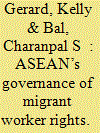

|
|
|
|
|
| Summary/Abstract |
Temporary migrant workers in Southeast Asia are subject to various abuses in recruitment, work and repatriation. A decade ago ASEAN governments committed to developing an Instrument governing migrant worker rights, but a series of deadlocks have stymied this agreement. Prevailing accounts explain this impasse as the consequence of incompatible national interests, norms of non-interference and consensus, a lack of institutional capacity and the limits of rights advocacy in ASEAN. Conversely, utilising a political economy framework, this article demonstrates this impasse in regional governance reflects societal-level conflicts among migrant workers, civil society organisations, business groups and state-based actors, generated by the latter’s adoption of migrant labour as both a livelihood and development strategy.
|
|
|
|
|
|
|
|
|
|
|
|
|
|
|
|
| 2 |
ID:
157882
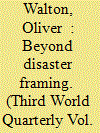

|
|
|
|
|
| Summary/Abstract |
This article examines how and why multi-mandate INGOs represent contemporary armed conflicts in particular ways. Based on empirical analysis of NGO communications and interviews with staff, it finds that these organisations typically adopt a two-track approach to representing conflicts. They use mainstream media to present consequence-oriented accounts to the general public, while utilising alternative channels to represent more nuanced depictions of conflict to more targeted audiences. These alternative forms of communication often aim to disrupt the dominant narratives of conflict produced by influential policy or media actors. Decisions about how to represent conflict are shaped by organisations’ histories, identities and funding relationships.
|
|
|
|
|
|
|
|
|
|
|
|
|
|
|
|
| 3 |
ID:
157880


|
|
|
|
|
| Summary/Abstract |
In development practice, how does ‘mutual benefit’ accrue, and to whom? China criticises America for perpetuating capitalist power relations and claims it can seek a new geopolitical order based on South–South cooperation. Meanwhile, there has been an extraordinary shift of emphasis towards the private sector as a driver of development, but this shift is attracting increasing criticism. The Millennium Challenge Corporation (MCC) – the only development agency to grow in influence under the Trump administration – is evaluated in the light of these two key themes. Neither China nor the private sector is successful in achieving ‘mutual benefit’ for ordinary citizens – both replicate existing power inequalities. As with the rise of both China and the private sector, the MCC also enmeshes developing countries further into the existing neoliberal capitalist structures. However, the advantages of the agency should not be dismissed outright, as its Ruling Justly and Investing in People indicators can enhance the capacity of citizens to challenge these power structures themselves.
|
|
|
|
|
|
|
|
|
|
|
|
|
|
|
|
| 4 |
ID:
157881


|
|
|
|
|
| Summary/Abstract |
Member states of the United Nations (UN) agree that its development system needs substantial reform given its fragmentation and outdated structures, as well as new demands from the 2030 Agenda. Yet, a recent two-year reform process yielded no substantial reform decisions. Why did member states fail to endorse the necessary reforms despite almost unanimous recognition of the need for change? This paper describes member states’ conflicting positions on reforming the UN and analyses their failure to delegate authority to the UN development system. North and South, donors and recipients, are locked in a struggle for power and control, maximising bilateral influence at the expense of the benefits of multilateral cooperation. The paper contributes to the pool of UN studies, adding a decidedly political perspective of the reform process. It is based on diplomatic statements, negotiation drafts and interviews with UN diplomats.
|
|
|
|
|
|
|
|
|
|
|
|
|
|
|
|
| 5 |
ID:
157888
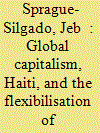

|
|
|
|
|
| Summary/Abstract |
This paper looks at the shifting manner in which paramilitarism has been reproduced in Haiti, examining how it has evolved from the Cold War into the era of capitalist globalisation. The central argument of this article is that paramilitarism has not disappeared but has been altered, and that this has occurred in part due to the changing strategies of elites in the global era. Rather than a permanent and widespread force, paramilitary groups are utilised in smaller numbers and only in certain ‘emergency periods’, serving a purpose of containment: targeting political threats and beating down those large populations whose social reproduction is not required by transnational capital. This has been a difficult situation for elites to manage, as they often have only limited control over such ruthless, corrupt and violent elements, which they sometimes require. Following the 1991 and 2004 coup d’états in Haiti, a military–paramilitary–bourgeoisie grouping has repeatedly worked to recover its impunity and revamp its coercive apparatus. Under these conditions, and even more increasingly in the wake of the 2010 earthquake, a variety of elites and technocrats (most importantly, US policymakers) have sought to politically remake the country alongside processes of economic restructuring promoted by transnational capital.
|
|
|
|
|
|
|
|
|
|
|
|
|
|
|
|
| 6 |
ID:
157886
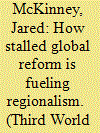

|
|
|
|
|
| Summary/Abstract |
In the Chinese view, the architecture of contemporary global governance – especially that of the Bretton Woods institutions – is flawed and in need of reform. Developing nations (like China), the argument runs, need to be given a role proportionate to their global economic influence. Since the Group of Twenty (G20) became a leaders’ summit in 2008, China has used the forum to push for such reform. But today, despite some supposed progress, reform has stalled. Recognising this fact, China is increasingly emphasising regional integration in its strategy for overcoming the middle-income trap. Global reform has not been abandoned, but – given its infeasibility – is no longer a short-term priority.
|
|
|
|
|
|
|
|
|
|
|
|
|
|
|
|
| 7 |
ID:
157884
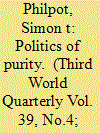

|
|
|
|
|
| Summary/Abstract |
The International Cricket Council and civil prosecutions of three Pakistani cricketers and their fixer brought player corruption in cricket to public scrutiny once more. A range of English media commentators and the sentencing judge referred to cricket’s loss of innocence because of the deception of the Pakistani cricketers. However, commercialisation, racism and dealings with corrupt political regimes have all exposed cricket as less innocent than many of its English defenders would admit. Furthermore, the demonisation of Pakistani cricketers as cheats blurs the boundary between individual responsibility and cultural characteristics with negative consequences for Muslims in the post-9/11 world.
|
|
|
|
|
|
|
|
|
|
|
|
|
|
|
|
| 8 |
ID:
157883


|
|
|
|
|
| Summary/Abstract |
This article responds to a recent call for increased empirical evidence on the ‘local turn’ in the peacebuilding literature and discusses the impact of the international on local consent for peace operations. Using fresh empirical material this article examines the case of the United Nations Interim Force in Lebanon (UNIFIL). It shows how local perceptions of the foreign policies of peacekeeping contingents matter, and how this affects the functionality of the mission. This article highlights the heterogeneity of both United Nations peacekeeping missions and local populations, an issue that is insufficiently discussed in the literature on local engagement in peacebuilding/peacekeeping.
|
|
|
|
|
|
|
|
|
|
|
|
|
|
|
|
| 9 |
ID:
157890
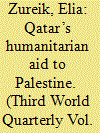

|
|
|
|
|
| Summary/Abstract |
The purpose of this paper is to document Qatar’s recent contribution of humanitarian aid to the Palestinians. We consider Qatar as an example of a mini state that relies on its wealth and soft power to further its interests in the Middle East and support a beleaguered Arab-Muslim state. The paper carries out analysis of Arabic newspapers and other documentary evidence to contextualise and estimate Qatar’s financial contribution 2010–2016. Contextualising Qatar’s aid necessitates considering Israel’s military control of the Palestinian Territories, and its ability through hard power to regulate the inflow of aid to Palestine. The paper concludes by calling for adopting the political economy perspective in dealing with humanitarian aid.
|
|
|
|
|
|
|
|
|
|
|
|
|
|
|
|
| 10 |
ID:
157889


|
|
|
|
|
| Summary/Abstract |
In Guatemala, development projects and practitioners are frequently associated with rumours. These rumours, often related to suspicions of ulterior motives, have a high degree of potency and endurance. This paper investigates this relationship between development and rumour, focusing on some of the more prevalent rumours including robaniños (baby-stealers), religious rumours regarding the Antichrist and rumours related to vaccinations and sterilisation. As a counter to perspectives which essentialise a lack of education in the perpetuation of rumours, I explore how they become devices through which one can understand power imbalances and everyday violence(s) inherent in many development projects and processes.
|
|
|
|
|
|
|
|
|
|
|
|
|
|
|
|
| 11 |
ID:
157885
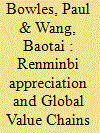

|
|
|
|
|
| Summary/Abstract |
China has experienced a rapid integration into Global Value Chains and a decade long appreciation of its exchange rate. However, these trends have been analysed largely in isolation from each other. In this paper, we explore the linkages between the two based on interviews with a sample of firms in Jiangsu Province. We show (1) how the distribution of the costs and benefits of exchange rate appreciation depends on the power hierarchies between firms in GVCs; (2) how exchange rate changes are important drivers of upgrading and even downgrading in GVCs; and (3) that the firm heterogeneity evident in GVCs provides additional insights into the politics of exchange rate determination in China.
|
|
|
|
|
|
|
|
|
|
|
|
|
|
|
|
| 12 |
ID:
157887


|
|
|
|
|
| Summary/Abstract |
Conventional policy and academic discourses have generally held illicit drug economies in Latin America to be synergistic with violence and instability. The case of post-transition Bolivia (1982–1993) confounds such assumptions. Applying a political economy approach, this article moves beyond mainstream analyses to examine how the Bolivian drug trade became interwoven with informal forms of governance, order and political transition. I argue that state–narco networks – a hangover from Bolivia’s authoritarian era – played an important role in these complex processes. In tracing the evolution of these interactions, the article advances a more nuanced theorisation of the relationship between the state and the drug trade in an understudied case.
|
|
|
|
|
|
|
|
|
|
|
|
|
|
|
|
|
|
|
|
|